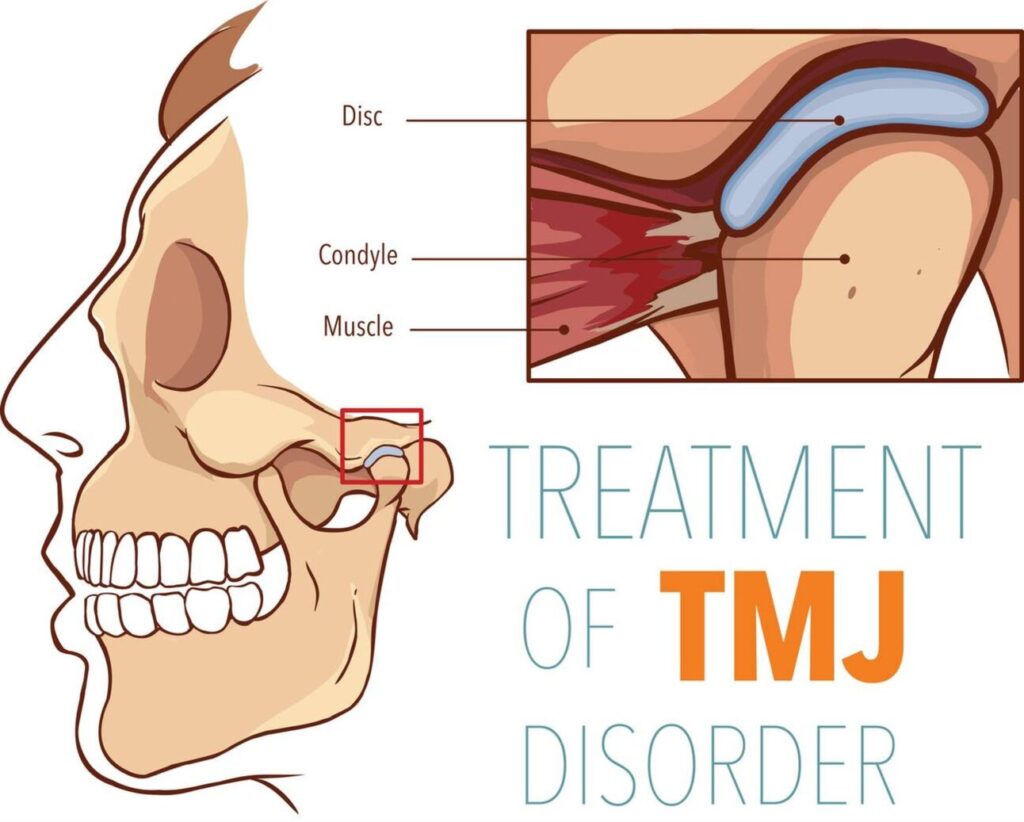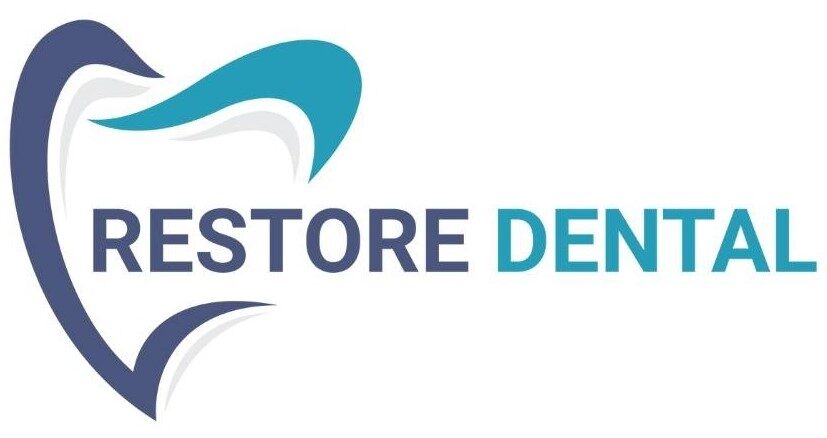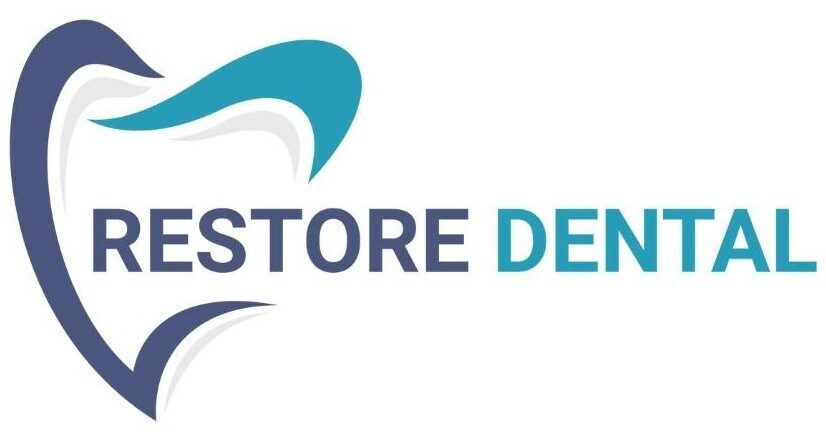services
TMJ Disorder
The temporomandibular joints (TMJ) are the two joints that connect your lower jaw to your skull, located just in front of each ear. These joints consist of the mandible (lower jaw) and the temporal bone (side and base of the skull) and are among the most complex joints in the human body. They allow for multiple movements—up and down, side to side, and forward and back—enabling essential functions like chewing, talking, yawning, and swallowing.
When the mandible and TMJs are properly aligned, these actions occur smoothly and without discomfort. However, when there is misalignment or lack of synchronization in the muscles, ligaments, disk, jawbone, or temporal bone, a variety of problems may arise.
The temporomandibular joint (TMJ) acts like a sliding hinge and plays a vital role in everyday jaw functions. When this joint is affected, it can lead to temporomandibular disorders (TMD)—a condition characterized by pain in the jaw joint and surrounding muscles.
At Restore Dental, a leading dental clinic in Gurgaon, we understand how TMJ disorders can disrupt your daily life. As a trusted TMJ specialist in Gurgaon, our team is dedicated to the accurate diagnosis and advanced treatment of TMJ-related issues. We offer effective, customized solutions focused on restoring comfort, improving jaw alignment, and helping you regain full jaw function with minimal discomfort.

What is a TMJ caused by?
The exact cause of TMJ disorder is often difficult to pinpoint. It may result from a combination of factors, such as teeth clenching or grinding (known as bruxism), excessive gum chewing, nail biting, stress, or underlying conditions like fibromyalgia, osteoarthritis, or previous jaw injuries.
In most cases, the pain and discomfort associated with TMJ disorders are temporary. Symptoms can often be managed effectively through self-care, jaw-specific physical therapy, and the use of a mouth guard. Surgery is typically considered only when conservative treatments have not provided relief, though it may benefit certain individuals with persistent TMJ issues.
Is TMJ from stress?
Scientific research has established a strong link between TMJ disorders and stress. Individuals with TMJ often experience higher levels of stress, and those under constant stress are more likely to develop TMJ symptoms.
Interestingly, several symptoms of TMJ and anxiety tend to overlap, including teeth grinding, fatigue, muscle tension or pain, and sleep disturbances. Anxiety can also aggravate TMJ, creating a vicious cycle where stress leads to muscle tightness in the jaw and face, intensifying TMJ-related pain.
For some, TMJ may cause only occasional flare-ups, while for others, it can develop into a long-term condition that significantly impacts daily life. Over time, chronic TMJ issues may also contribute to mood disorders like depression due to ongoing discomfort and decreased quality of life. Given its potential to affect both mental and physical well-being, seeking timely and appropriate treatment for TMJ is essential to prevent long-term complications and restore comfort.
Is TMJ a serious problem?
While not life-threatening, TMJ disorders can severely affect daily life if untreated. They may cause chronic jaw, face, and neck pain, limited mouth opening, and issues like headaches, dizziness, earaches, or tinnitus. In serious cases, untreated TMJ can lead to joint damage, dislocation, or arthritis.
When to See a Doctor:
- Constant or severe jaw pain
- Difficulty opening or locking of the jaw
- Headaches, earaches, or ringing in the ears
Most cases improve with non-surgical treatments like physical therapy, mouthguards, medication, and lifestyle changes. Surgery is rarely needed and reserved for severe cases. Early diagnosis and treatment can relieve pain, prevent long-term damage, and improve your overall well-being.
Is TMJ a lifelong problem?
In many cases, TMJ-related pain is temporary and resolves within a few days to a couple of weeks. Simple home remedies—like applying ice or heat, taking over-the-counter pain relievers, and eating soft foods—can help manage discomfort during recovery. However, when TMJ pain is caused by chronic issues like arthritis or bruxism (teeth grinding or jaw clenching), it may persist until the underlying cause is treated.
Can TMJ Go Away on Its Own?
Yes, in most cases, TMJ disorders improve without medical intervention. Pain management and avoiding strain on the jaw are usually enough. But if symptoms are severe or ongoing, professional evaluation is recommended. You should see a TMJ specialist if you experience:
- New or worsening jaw clicking/popping
- Persistent jaw pain unrelieved by painkillers
- Frequent migraines or headaches
- Difficulty fully opening or closing your mouth
- Earaches, dizziness, or facial pain
- Trouble chewing or uneven tooth wear
Why Choose 3D-Printed Splints Over Traditional TMJ Devices?
Our approach to TMJ disorder management involves the use of custom-fabricated hard and soft splints. Using advanced
3D printing technology, we create splints that are highly precise and tailored to fit your unique anatomy. These splints help:
- Relieve pressure on the TMJ Disorder.
- Stabilize the jaw to prevent further damage.
- Alleviate pain and discomfort in the facial muscles.
- Innovative Technology: Our use of 3D printing ensures accuracy and a perfect fit for your splint.
- Personalized Care: Every treatment is tailored to address your specific symptoms and needs.
- Expertise: Our skilled team is experienced in managing TMJ disorders for lasting relief.
Can TMJ be cured permanently ?
- Consult a Dentist or TMJ Specialist
Proper diagnosis is key. Treatment options may include:- Nightguards to prevent teeth grinding
- Dental splints to realign the jaw
- Orthodontic treatment for bite correction
- Physical Therapy
Helps improve jaw function and reduce pain through:- Jaw exercises
- Electrical stimulation
- Muscle relaxation techniques
- Non-Surgical Treatments
Common conservative approaches:- Trigger point injections (Botox or corticosteroids)
- Ultrasound therapy
- Lifestyle changes (soft foods, posture correction, avoiding gum)
- Stress management (meditation, relaxation exercises)
- Surgical Options (For Severe Cases)
Considered when all else fails:- Arthroscopy: Minimally invasive joint correction
- Open-Joint Surgery: For advanced damage or dislocation
The temporomandibular joint (TMJ) acts like a sliding hinge, connecting your jawbone to your skull—one joint on each side of your jaw. This joint plays a vital role in everyday functions such as chewing, speaking, and yawning. However, when the TMJ is affected, it can result in temporomandibular disorders (TMD), which cause pain in the jaw joint and the muscles that control jaw movement. At Restore Dental, a leading dental clinic in Gurgaon, we understand how disruptive TMJ disorders can be to your daily life. Our team specializes in accurately diagnosing and treating TMJ-related issues with advanced, effective solutions tailored to restore comfort and jaw function.
Understanding TMJ Disorder
TMJ disorders can manifest in various ways, including:
- Clicking Sounds: A noticeable clicking or popping sound when opening and closing your mouth.
- Jaw Deviation or Deflection: Misalignment or abnormal movement of the jaw.
- Facial Pain: Discomfort or soreness in the muscles of the face and jaw.
Advanced Treatment with 3D-Printed Splints
Our approach to TMJ disorder management involves the use of custom-fabricated hard and soft splints. Using advanced 3D printing technology, we create splints that are highly precise and tailored to fit your unique anatomy. These splints help:
- Relieve pressure on the TMJ Disorder.
- Stabilize the jaw to prevent further damage.
- Alleviate pain and discomfort in the facial muscles.
- Innovative Technology: Our use of 3D printing ensures accuracy and a perfect fit for your splint.
- Personalized Care: Every treatment is tailored to address your specific symptoms and needs.
- Expertise: Our skilled team is experienced in managing TMJ disorders for lasting relief.
Your Smile Deserves the Best!
Get in Touch with Restore Dental
Our team at Restore Dental is here to help! Fill out the form below, and we’ll get back to you as soon as possible. Let’s bring back your healthy, confident smile!
FAQs
What is a TMJ disorder?
A TMJ disorder refers to a condition affecting the temporomandibular joint, which connects your jawbone to your skull. This disorder can lead to pain and dysfunction in the jaw joint and the muscles controlling jaw movement.
What are the common symptoms of TMJ disorders?
Symptoms may include:
- Pain or tenderness in the jaw
- Clicking or popping sounds when opening or closing the mouth
- Difficulty chewing or discomfort while chewing
- Aching facial pain
- Locking of the joint, making it hard to open or close the mouth
What causes TMJ disorders?
TMJ disorders can be caused by various factors, including:
- Jaw injury
- Teeth grinding or clenching (bruxism)
- Arthritis in the joint
- Stress, leading to tightened facial and jaw muscles
How are TMJ disorders diagnosed?
A healthcare provider may:
- Listen to and feel your jaw when you open and close your mouth
- Observe the range of motion in your jaw
- Press on areas around your jaw to identify sites of pain or discomfort
What treatment options are available for TMJ disorders?
Treatment may include:
- Pain relievers and anti-inflammatories
- Oral splints or mouth guards
- Physical therapy
- Counseling to understand and manage stress or behaviors that may aggravate the condition
Can TMJ disorders go away on their own?
In some cases, symptoms may resolve without treatment. However, if symptoms persist or interfere with daily life, it’s advisable to seek professional care.
Are there any self-care practices to alleviate TMJ discomfort?
Yes, self-care practices include:
-
- Eating soft foods
- Avoiding extreme jaw movements
- Practicing stress-reducing techniques
- Applying moist heat or cold packs
For personalized advice and treatment options, consider consulting with a dental professional experienced in managing TMJ disorders.
Discover More - Expert Articles on TMJ Disorder

Understanding the 4 Stages of TMJ Disorder – From Mild Discomfort to Severe Damage
Understanding the 4 Stages of TMJ Disorder – From Mild Discomfort to Severe Damage...

TMJ vs. TMD – What’s the Difference and Why It Matters
TMJ vs. TMD You might have heard the terms “TMJ” and “TMD” used interchangeably — even by medical professionals. But while...

The 3-Finger Test for TMJ – A Simple Self-Check for Jaw Health
The 3-Finger Test for TMJ The temporomandibular joint (TMJ) plays a vital role in everyday functions like chewing, speaking, and yawning....


